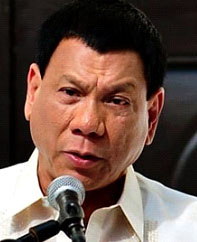WASHINGTON, (Reuters) – The United States signaled yesterday it will work with the apparent victor of the Philippines presidential election, Rodrigo Duterte, despite allegations of human rights abuses in the city he has led for over two decades.
Washington’s stance reflects the reality that U.S. national security interests will outweigh human rights concerns given China’s increasingly assertive stance in the region and the maritime disputes in the South China Sea, Asia analysts said.

“Washington respects the choice of the Philippine people. We gladly work with the leaders they’ve selected,” State Department spokeswoman Elizabeth Trudeau said when asked about Monday’s election.
An official winner had not been declared but an unofficial count by an election commission-accredited watchdog showed Duterte had a huge lead over his two closest rivals, both of whom conceded defeat.
When pressed whether Washington had concerns about positions advocated by the tough-talking Duterte, including extrajudicial killings to stamp out crime and drugs, Trudeau repeated her statement that Washington respected the choice of the voters.
“We look forward to working with the leader that the Philippines has elected,” she said.
Duterte’s vows to restore law and order resonated with Philippine voters, but his incendiary rhetoric and advocacy of extrajudicial killings to stamp out crime and drugs alarmed many people, who saw it as harkening back to the country’s authoritarian past.
Duterte has been criticized for allowing a spree of vigilante killings in Davao city and critics fear he could let them happen on a larger scale as president.
Although the United States closed its military bases in the Philippines in 1992, the two nations are bound by a 1951 mutual defense treaty and the former colony is a key element of the U.S. policy of “rebalancing” its foreign policy toward Asia.




